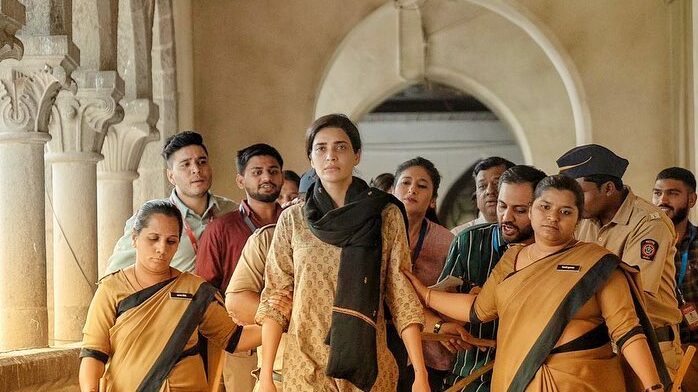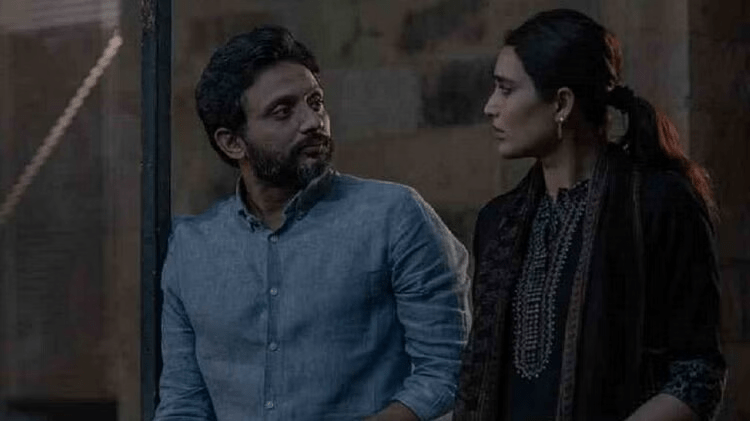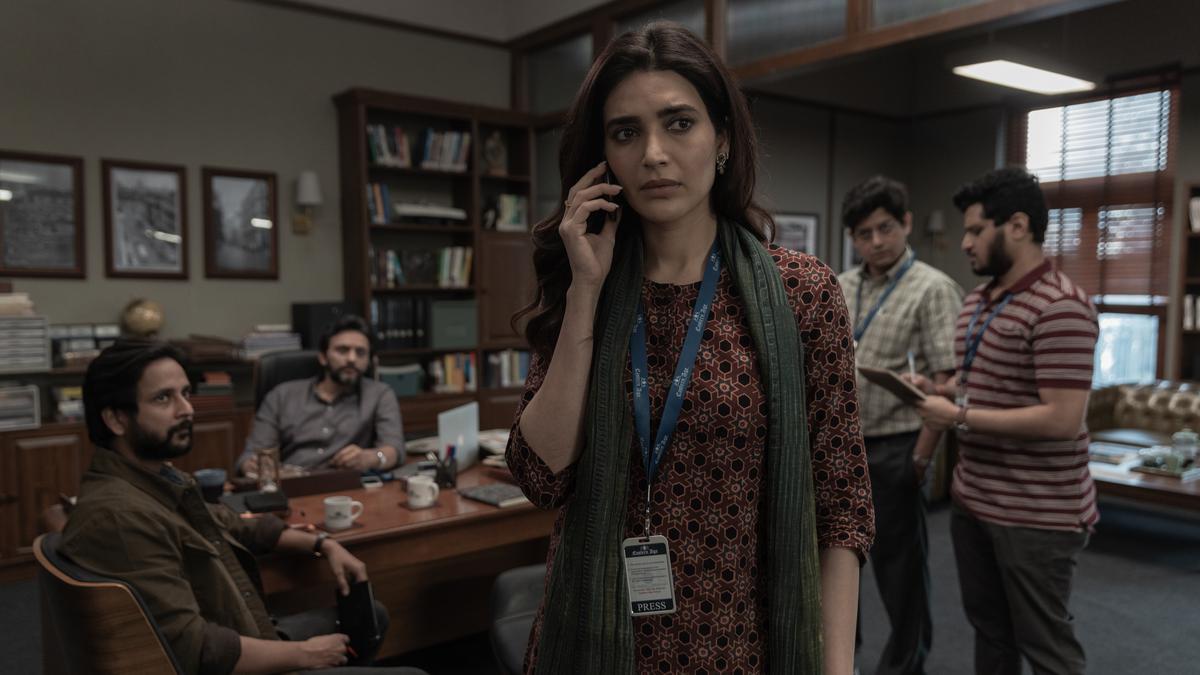The newly released OTT show is loud and clear regarding its thematic focus: speaking truth to power. Hansal Mehta and Mrunmayee Lagoo’s Scoop streaming on Netflix has successfully told a riveting tale, depicting incidents from the early 2000s.
Based on Jigna Vora’s book Behind Bars in Byculla: My Days in Prison, Scoop tells the story of a crime reporter who is wrongfully incarcerated. The show dwells on the minute details of the horrific experience of incarceration, as gender decides the nature of harassment faced by the female protagonist.
From highlighting the gendered realities of a patriarchal society to commenting on decadence in journalistic ethics, the show touches on some of the most important issues of our times.
The plot revolves around the murder of one of the leading Indian crime reporters and the incarceration of another – a real-life incident documented in Vora’s book. While the story draws from incidents of the past, the portrayal of wrongful incarceration in an OTT show in today’s India comes across as a timely reminder to, as Imran’s character remarks, “Look out of the window to find out the truth.”
The show takes the audience through the journey of the incarcerated journalist, Jagruti Pathak (played by Karishma Tanna), who displays passion, expertise, and ambition at work. Qualifying as an excellent crime reporter does not keep her in the good books of those in power for long, turning her into a “scapegoat” who must take the brunt of a failing law and order system.
Imran, the chief editor at Jagruti’s news agency, (played by Zeeshan Ayyub), points to the machinations of a corrupt, patriarchal world order that safeguards those in power at the cost of Jagruti’s dignity, “Who else could be a better scapegoat than a successful female crime-reporter.”

Scoop offers a realistic picture of life behind bars, especially for those who are wrongfully incarcerated. The Indian constitution’s commitment to justice and the maxim, “innocent until proven guilty,” are seen to be challenged by the turn of events in the show. Debates on the character of the accused flashed on television screens and all over print media with no regard to the truth appear as eerily familiar and relatable.
Women in Scoop ask for what they deserve unapologetically, fully aware of their intellectual and emotional labour in a workspace dominated by men.
The audience who has witnessed media trials, cyber harassment, and victim-blaming, become the norm in the recent past will find a lot to relate to. The language of such harassment is fuelled by misogyny towards women who claim their agency against all odds. The Indian viewers are familiar with media trials labelling women as “daain,” or “churail,” (witch), “practitioner of black magic,” and so on, as per convenience.
Scoop does a remarkable job of portraying women characters who do not shy away from being ambitious. Women in Scoop ask for what they deserve unapologetically, fully aware of their intellectual and emotional labour in a workspace dominated by men.
Working women, including Jagruti, are shown to walk on eggshells even in supposedly safe spaces – at work and at home. As accusations against Jagruti are steeped in misogyny, labelling her as a “rakahil” (mistress) of the primary accused in a murder case, Anita (played by Ira Dubey) is shattered by allegations of offering sexual favours at the office in return for her promotion.

Jagruti’s former colleagues pitching the story of her sharing the prison with the criminals she had reported on, shows the extent of animosity towards a successful woman at the workplace. Her illustrious career is conveniently reduced to apprehensions regarding her incarceration.
The overarching shadow of misogyny is felt at every step and captured in a near-perfect portrayal – suffocating the women characters in the plot and deliberately making the audience somewhat uncomfortable. Scoop has succeeded in unwrapping the many layers of gender discrimination and harassment faced by women at workplaces in India.
The show accommodates debates on journalistic ethics and decency in a way that immediately establishes a dialogue with our times. As the role of media in presenting the truth appears to be questionable in today’s India, the show stresses on the responsibilities of the fourth pillar of democracy.
“Looking out of the window,” as quoted by Imran, becomes a metaphor for seeking the truth as a journalist as opposed to quoting “both” sides, the true and the false. Imran’s character reminds the audience time and again that journalism is not about pleasing or entertaining those in power. The well-scripted critique of indecency in journalism, skilfully delivered by Zeeshan Ayyub, gives the show its moral backbone. Imran’s character emerges as the voice of conscience in the series.

Guided by his ethicality, Imran refuses to bow down to power. He urges to be fired for speaking the truth – an act that brings back fresh memories of Indian journalists choosing resignation over compromises in journalistic duties in recent times. Scoop accommodates skilfully-crafted warnings delivered right in time – the “job” of a journalist is not to be a stooge to those in power, but to question them. It is interesting to see how the show entertains and makes a statement at the same time.
Scoop has not minced words in voicing criticism against attacks on the media through responsible storytelling and artistic expertise. The series ends with a heart-wrenching tribute to the Indian journalists who have been targeted, assassinated, or wrongfully incarcerated.
The tribute reads, “Since 2000, nearly 102 journalists have been reported as arrested, killed, or missing.” The tribute section makes Scoop one of the very few works in the field of OTT that has shown the courage to remember the incarcerated and assassinated Indian journalists in the recent past.

The tribute mentions the murder of journalist Gauri Lankesh, an incident that shook the nation in 2017. The more recent attacks on the freedom of the press find mentioned in the tribute section – Siddique Kappan, Santosh Yadav, Rupesh Kumar Singh, Iqbal Jakati, Gautam Nauakha and other incarcerated Indian journalists are remembered.
Drawing from multiple instances where journalists have been subjected to harassment, death threats, and imprisonment, the tribute section assures that the concerns regarding freedom of the press in India are not viewed as a nameless, faceless claim.
As per the Reporters Without Borders (RSF) reports on World Press Freedom Index, India ranks 161 out of 180, with India’s position consistently falling since 2016. India’s Performance Analysis clearly states the major reasons behind the falling index – “increased violence against journalists, and politically partisan media.” Issues of censorship and the safety of journalists are among the deciding factors in determining press freedom in the region.
The falling index of press freedom in India along with the rigid patriarchal framework within which women journalists are forced to operate is telling of the condition of the ‘fourth pillar of democracy,’ in the world’s largest democracy.
The artistic and political moves in Scoop are pertinent to the socio-political realities of our times. The series is a love letter to those, like Imran, who choose to look out of the window to find out the truth. Presented with utmost sincerity, Scoop is a beautifully-crafted tribute to fearless journalism.




